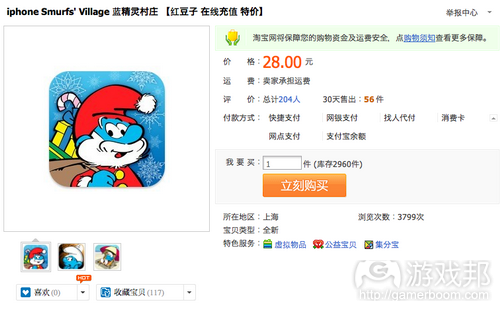中国市场的虚假交易行为令开发者步履维艰
作者:Kim-Mai Cutler
在过去几年里,许多iOS开发者之所以会从付费应用转向免费模式的其中一大原因在于,游戏的服务导向模式更不容易遭遇盗版问题。
但在广阔的中国市场,就连免费模式也充斥着各种非法虚拟商品。
CocoaChina是中国最大的iOS开发者社区,它从红杉资本(游戏邦注:红杉资本于1972年在美国硅谷成立,在中国,红杉资本中国团队目前管理约20亿美元的海外基金和近40亿人民币的国内基金,用于投资中国的高成长企业)及其它投资者那募集了1400万美元的资金。公司发现了一种能够给予玩家较大虚拟货币包折扣的欺骗伎俩,如图中Capcom的《蓝精灵村庄》所示。
一些卖家选择在中国的易趣(游戏邦注:知名网上购物网站)或淘宝以半价或更低折扣销售虚拟货币。他们创建附着于虚假信用卡iTunes帐户,供玩家登陆,并指导他们如何在游戏中填充游戏币。而这时候开发者便会发现他们的日收益同月底在苹果的实际付款数据相矛盾,因为开发者并不能从这些虚假帐号消费中获得收益。
而这种伪造信用卡便是我们常说的“黑卡”,主要针对中国境外的iTunes帐户。所以开发者在中国市场上的收益不一定会存在差异,但他们在欧洲或北美市场所获得的利润就不是如此。另一个关键点是,这种欺骗行为不只存在于越狱版的iPhone,连合法iPhone也包括在内。
除此之外,这种欺诈伎俩也能够运作于付费应用(如下图迪士尼的《Where My Water》在淘宝的售价是3元人名币或0.48美元,而不是0.99美元)。就付费应用来说,卖家会先通过虚假信用卡购买应用,然后以礼品卡的形式转给玩家。
这种“黑卡”也会影响到创收榜单的排名,你会发现某款中国应用(既没有进行本土化,也没有任何英文版本的翻译)不可思议地攀升至美国或英国排行榜的前列。就像本周来自上海Mehe开发商的一款游戏竟然跻身美国畅销应用榜单的第17名,虽然这款游戏完全采用中文。能够获得美国排行榜如此高的排名,就说明这款游戏每天能够获得5万多美元的收益。
比起排名相近的其它免费游戏(游戏邦注:它们的评级从1000多到5万多不等),Mehe这款游戏的评级只有33。甚至有很多用户评价称游戏会莫名其妙地从他们的iTunes帐户中扣去30美元至100美元不等的费用,虽然有不少来自中国市场的玩家给予正面评价。
由于很多消费者并未全额购买虚拟货币,所以开发者很难衡量游戏的实际成本。除此之外,开发者还必须处理这些虚假交易所涉及的服务器运作和托管成本。
为了打击这种欺骗行为,CocoaChina安排员工时刻留意是否有人在淘宝提供Punchbox游戏的折扣虚拟货币。他们表示,要让淘宝预先阻止这些行为几乎不可能。
他们还和中国的其他顶尖开发者组成了“反黑卡联盟”,共同提防任何围绕联盟成员作品所进行的欺骗行为。CocoaChina表示,自从他们开始对淘宝展开监视,游戏销量获得了30%的提高,而以前这些收益都流失到虚假交易中。他们还表示,联盟成员游戏中的这种欺骗交易情况也减少了八、九成。
总而言之,这再次说明开发者要在中国手机应用市场创收很困难。尽管从收益来看,中国已经迅速变成苹果的第二大市场,但在这片市场中,意图涉足手机游戏业务的本土开发者面临众多障碍。根据创新工场投资的友盟网表示,中国有一半的iPhone都已越狱,可以说越狱已经在中国形成一股风潮。付费应用模式未能顺利运作的原因也在于这种情况及盗版现象,因此许多顶级游戏开发者,如EA PopCap逐步转而采用服务导向模式。
虽然这么说,但苹果开始提供以元为单位的本土付费选择,并且还和当地主要银行的记账卡绑定。在此之前,没有信用卡的iPhone用户经常选择到通过淘宝购买iTune礼品卡。(本文为游戏邦/gamerboom.com编译,拒绝任何不保留版权的转载,如需转载请联系:游戏邦)
The virtual currency scam from China that’s costing iOS developers real cash
By Kim-Mai Cutler
One of the many reasons iOS developers have switched from paid apps to the free-to-play model over the past year is that the service-oriented model of gaming is less vulnerable to piracy.
But it seems that in the Wild Wild East of China, even the freemium model can be circumvented with fraudulently-purchased virtual goods.
CocoaChina, which hosts the largest iOS developer community in China and raised $14 million from Sequoia China and other investors, discovered a scam that’s giving players deep discounts on virtual currency packs in games like Capcom’s Smurfs’ Village.
Basically, sellers go onto the eBay of China, or Taobao, to sell virtual currency at half-price or more. They create an Apple iTunes account attached to a fraudulent credit card number and then give the buyer the log-in and a tutorial on how to recharge their game with currency. Developers will see a discrepancy between their daily revenues with actual payments from Apple at the end of the month, once all of the fraudulent payments are skimmed out of their revenues.
These fake credit card numbers, sometimes called “black cards,” are often created for iTunes account outside of China. So developers won’t necessarily see a discrepancy in their Chinese revenues, but rather their European or North American revenues. The other key point is that this fraud works on legitimate iPhones, not just jailbroken ones.
The scam also works with paid apps too (see the image below with Disney’s Where My Water on sale for 3 yuan or $0.48, instead of $0.99). For paid apps, the seller will buy the app with a fraudulent credit card and then gift it to the buyer.
You can sometimes see the impact of “black cards” on the top grossing charts when a Chinese app — with no localization or English translation whatsoever — mysteriously climbs up the charts in the U.S. or U.K. This happened this week when an app from developer Shanghai Muhe reached No. 17 on the grossing charts in the U.S. even though the app is entirely in Mandarin. To get to that kind of ranking in the U.S., a game would need to be doing around $50,000 or so per day in revenue.
The game also only has 33 ratings compared to the other free apps around it, which have anywhere from more than 1,000 to more than 50,000 ratings. Many of the user reviews also say that the app somehow charged their iTunes account for between $30 and $100 without their consent even though the game has hundreds of positive reviews in Mandarin-speaking markets.
Ultimately, it’s hard to gauge the actual cost to developers since these consumers probably wouldn’t have paid full price for the virtual currency anyway. Still, developers have to handle the server and hosting costs of the gameplay from these false transactions.
To combat the fraud, CocoaChina has employees constantly watch Taobao for posts offering discounts on virtual currency for games from its studio Punchbox. It’s not really feasible for Taobao to preemptively stop these listings, they say.
They also started an Anti-Black Card Alliance with other top Chinese developers to watch for fraud around games from any of the alliance members. CocoaChina says since they’ve started monitoring Taobao for fraud regularly, the company has seen a 30 percent increase in revenue from purchases that would have otherwise been tied to the scam. They said alliance members have also seen an 80 to 90 percent reduction in fraudulent transactions overall.
Overall, the scam is yet another story about how difficult it is to monetize mobile apps in China. Even though the country has quickly emerged as Apple’s second largest market in terms of revenue, China poses all sorts of difficulties to mobile developers looking to build a business locally. About one-half of all iPhones are jailbroken, according to Innovation Works-backed Umeng, which is like the Flurry of China. The paid app model doesn’t really work because of this fact plus piracy, so many top developers there like EA PopCap are moving to more of a service-oriented model.
That said, Apple started offering local payment options that are denominated in yuan and are tied to debit cards from several of the country’s top banks. Before that, iPhone owners without credit cards would often turn to Taobao to buy iTunes gift cards. (Source:Inside Mobile Apps)









































 闽公网安备35020302001549号
闽公网安备35020302001549号